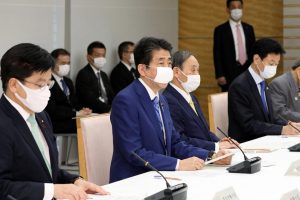At an upper house finance committee meeting on June 4, Japanese Finance Minister Taro Aso claimed that Japan’s relatively low COVID-19 death rate is due to “the superiority of its people.” He argued that Japan has achieved a moderate mortality rate with the least legally binding restrictions on personal freedoms, which proves the excellence of the public. “People in other countries can’t do that, even being forced,” he added. In the original Japanese article, the argument continued: “What matters is fatalities; just like in war where victory or defeat is contingent on the number of casualties. France with 228 [deaths per million people], the U.S. with 824, the U.K. with 309, and we have 7.”
Despite his comments coming under criticism by some other members at the meeting, as well as foreign media, for being divisive and conceited, the atmosphere of blowing one’s own horn is increasingly prominent in the country, something conservative advocates are actively taking advantage of. Shigeharu Aoyama, a member of the ruling Liberal Democratic Party and the House of Councilors, calling the virus by the derogatory name “Wuhan fever,” asserted on a radio program that the current situation is a “Japan Miracle.” He argued that the government’s previously criticized measures are in fact working out and thus Japan will be a preventive role model for the world, while making no reference to specific measures that proved successful. Conservative media outlets like Nippon Broadcasting Inc. and Sankei Shimbun started giving unreserved praise to the government’s strategy of containment.
Even the World Health Organization chief, Tedros Ghebreyesus, seconded this by assessing that Japan has proved a “success” in containing the spread of COVID-19 infections. Some of the overseas reactions remain critical, but many others like the Guardian, Asia Times, and Business insider approved Japan’s approach to a certain extent. In other words, a favorable atmosphere for the ruling conservatives is also coming from outside the country.
The conservative’s self-confidence tacitly rests on an assumption that the pandemic offers a clear-cut victory or defeat – as if Japan is winning a game. However, as will be explained below, those who assert that Japan is coming out ahead must suffer from a fundamental problem, which is a lack of evidence to support their argument. Aso’s remarks are problematic in many other ways too. First, he assumes the country is a homogenous entity and overlooks the more than 2.8 million foreign residents in Japan. Second, Japan’s mortality rate (0.56 per 100,000) is actually not so low when compared to Asian neighbors like South Korea (0.51), Thailand (0.08), and Taiwan (0.03). A Japan Medical Journal article pointed out that Japan’s death rate is in fact the second highest in the region.
One truth in Aso’s remark is that Japan has baffled the world for not being hit harder by the virus, while the government’s handling of the crisis has been widely criticized as halfhearted. For example, the country was under a state of emergency for seven weeks starting from April 7, but the measures were confined to voluntary cooperation of businesses and citizens, with social distancing left to the individual’s discretion. Then there was the Diamond Princess fiasco, in which the belated response by the government allowed 700-plus cases to spread in the cruise ship. The Australian Broadcasting Corporation (ABC) poignantly described Japan’s condition as “a recipe for a coronavirus catastrophe.”
The country also took a unique approach in attempting to stem infections. Japan, with the ninth largest population in the world at 120 million, devoted itself to detecting and treating infection clusters one by one rather than conducting a massive testing campaign.
Therefore, it came as a surprise that the daily number of new cases started decreasing from early May. As of late June, the total known cases are still below 20,000. Immunologist Tasuku Honjo, speaking in an ABC interview, avowed that this relative lull is also a mystery to him and speculated that the cultural practice of keeping physical distance and valuing cleanliness might have contributed to the containment. Scores of hypotheses have been tested to identify what Nobel laureate Shinya Yamanaka calls “Factor X,” the secret of Japan’s low Infection rate. In line with Honjo, some have attributed it to the country’s social norm of physical isolation. A Japanese habit of wearing masks is a factor, but cannot be the only reason. Iwasaki and Grubaugh scrutinized factors including BCG vaccination, a potential contributor to the containment, and suggested that there might be inherent factors that have not yet been identified. In short, none of the hypotheses has been successful in identifying Factor X.
Thanks to the relatively few known cases and contained death rate of the country, the self-praise of Japanese conservatives is gaining momentum. However, conservatives like Aso inevitably fail to justify themselves because the necessary explanation, namely how Japan has achieved victory, is absent. Without an understanding of where Japan’s success came from – and whether it will last — their argument is nothing more than a house of cards.
Yusaku Yoshikawa is a member of staff at a consultancy firm and currently engaged in Japanese Official Development Assistance (ODA) Projects in Africa. He completed his master’s majoring in anthropology at Wageningen University and Research, the Netherlands.

































